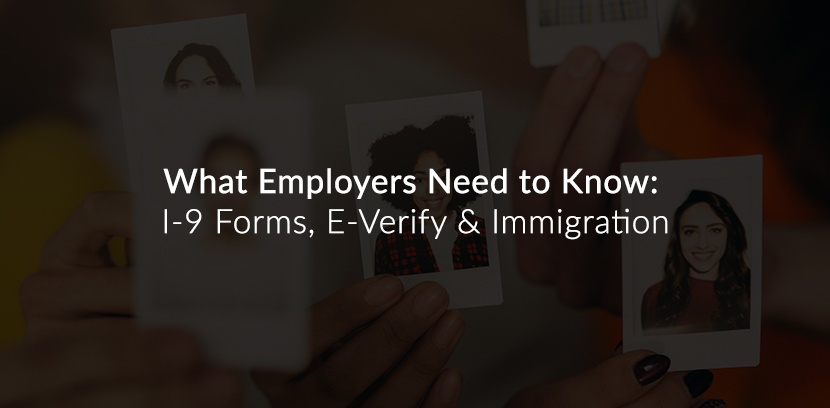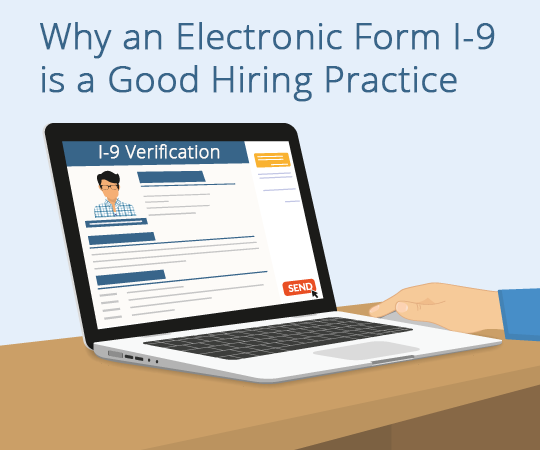Workforce Eligibility: E-Verify Requirements in every State

Updated E-Verify Requirements
In order for job applicants to be able to work in the United States, they must go through select requirements to prove citizenship or eligibility to work in the country. While voluntary except for federal contractors, E-Verify was created to allow employers to run potential employees through a federal internet database to determine their workforce eligibility. E-Verify provides employers fast and free information on United States citizens and foreign citizens who have valid documentation to work in the U.S.
When it comes to E-Verify mandates, every state is different. Some states require E-Verify checks on all applicants, while others do not require one at all. Below is a list of E-Verify employer responsibilities broken down by state. Please note, this list will be updated regularly. To receive automatic updates, you may subscribe to this blog using the options above.
We have compiled a complete and updated list of E-Verify requirements in every U.S. state.
Updated: January 22, 2021

Please note that the E-Verify program continues to issue temporary guidance with regards to COVID-19 and Form I-9 requirements.
Alabama - Mandatory E-Verify for all employers, public and private.
Alaska - E-Verify is voluntary for all employers.
Arizona - Mandatory E-Verify for all employers, public and private.
Arkansas - E-Verify is voluntary for all employers.
California - Limits E-Verify requirements due to misuse with new legislation going into effect in January 2016.
Colorado - Mandatory E-Verify for government contractors only. Private employers may voluntarily use the system.
Connecticut - E-Verify is voluntary for all employers.
Delaware - E-Verify is voluntary for all employers.
Florida - Mandatory E-Verify for public employers, contractors and subcontractors. Effective January 2021, private employers are not mandated to use E-Verify unless they have a contract with a public employer or they apply for taxpayer-funded incentives. Private employers not using E-Verify must keep copies of documents used to complete Form I-9 for three years.
Georgia - Mandatory E-Verify for public employers, contractors and subcontractors. Private employers are required to use it if they have more than 10 employees.
Hawaii - E-Verify is voluntary for all employers.
Idaho - Mandatory E-Verify for government agencies and contractors. Private employers may voluntarily use the system.
Illinois - Employers were prohibited from using E-Verify to check immigration status of current employees or applicants. Although no longer the case, employers that do use it must follow strict procedures.
Indiana - Mandatory E-Verify for state and local government agencies and government contractors. Private employers may voluntarily use the system.
Iowa - E-Verify is voluntary for all employers.
Kansas - E-Verify is voluntary for all employers.
Kentucky - E-Verify is voluntary for all employers.
Louisiana - Mandatory E-Verify for private contractors and subcontractors doing business with public entities. Private employers must either use E-Verify or keep copies of documents used to complete Form I-9.
Maine - E-Verify is voluntary for all employers.
Maryland - E-Verify is voluntary for all employers.
Massachusetts - Mandatory E-Verify for state agencies.
Michigan - E-Verify is voluntary for most employers and mandatory for contractors and subcontractors of the transportation department. Some counties have also chosen to use E-Verify such as Ingham, Macomb and Oakland.
Minnesota - Mandatory E-Verify for all employers and contractors working on behalf of the state. Private employers may use E-Verify voluntarily.
Mississippi - Mandatory E-Verify for all public and private employers.
Missouri - Mandatory E-Verify for all public employers or contractors. Private employers are incentivized to use the system.
Montana - E-Verify is voluntary for all employers.
Nebraska - Mandatory E-Verify for state and local government employers and contractors.
Nevada - E-Verify is voluntary for all employers.
New Hampshire - E-Verify is voluntary for all employers.
New Jersey - E-Verify is voluntary for all employers.
New Mexico - E-Verify is voluntary for all employers.
New York - E-Verify is voluntary for all employers, however, in 2020, legislation was proposed to prohibit employers from using E-Verify to check the employment status of existing employees or applicants who have not been offered employment. Contractors with the village of Suffern, NY must be verified within the system.
North Carolina - Mandatory E-Verify for state, county, city and other government agencies. Mandatory E-Verify was gradually rolled out to private employers and now stands as mandatory for private employers with more than 25 employees.
North Dakota - E-Verify is voluntary for all employers.
Ohio - E-Verify is voluntary for all employers.
Oklahoma - Mandatory E-Verify for state and local employers on all employers, contractors and subcontractors.
Oregon - E-Verify is voluntary for all employers. Two bills were proposed in 2015 to make e-verify mandatory for all employers. Columbia County requires all county employers to use the program.
Pennsylvania - Mandatory E-Verify for all state and local government contractors and public works contractors. Beginning October 2020, construction employers are required to use E-Verify.
Rhode Island - The mandatory use of e-verify for all employers in Rhode Island ended in 2011. E-Verify is now voluntary for all employers.
South Carolina - Mandatory E-Verify for all employers. Also, employers may not use driver's license or state ID to confirm employment authorization.
South Dakota - E-Verify is voluntary for all employers.
Tennessee - Mandatory E-Verify for all public and private employers or use of other forms of identification.
Texas - Mandatory E-Verify for all state employers and contractors.
Utah - Mandatory E-Verify (or other state equivalent "status verification system") for all public employers, contractors and subcontractors. Private employers with more than 15 employees must also use E-Verify unless employees are aliens on H-2A (temporary agricultural) and H-2B (temporary, non-agricultural) visas.
Vermont - E-Verify is voluntary for all employers.
Virginia - Mandatory E-Verify for all state agencies and businesses. Also, employers entering into state contracts in excess of $50,000 with an average of 50 employees the previous 12 months must use E-Verify.
Washington - E-Verify is voluntary for all employers but some cities and counties have their own requirements such as: Whatcom County, Pierce County, Lewis County except Centralia, Cowitz County, Clark County, and the cities of Yakima (rescinded in 2019), Lakewood, Kennewick and Hoquiam.
West Virginia - E-Verify is voluntary for all employers.
Wisconsin - E-Verify is voluntary for all employers.
Wyoming - E-Verify is voluntary for all employers.
Monitor Updates to E-Verify State Regulations
As federal and state regulations are subject to change, VeriFirst will update this list when new information is made available. We encourage you to subscribe to this blog for important notifications.
VeriFirst is a certified employer agent with the U.S. Department of Homeland Security and U.S. Citizenship and Immigration Services. We help businesses stay compliant using our integrated background screening and Form I-9 verification platform, the "Compliance Cloud". Many of the services offered are free of charge.
E-Verify® is a registered trademark of the U.S. Department of Homeland Security.
Share this
You May Also Like
These Related Stories

What Employers Need to Know: I-9 Forms, E-Verify & Immigration

Construction Industry Employee Verification Act Requires E-Verify in Pennsylvania

